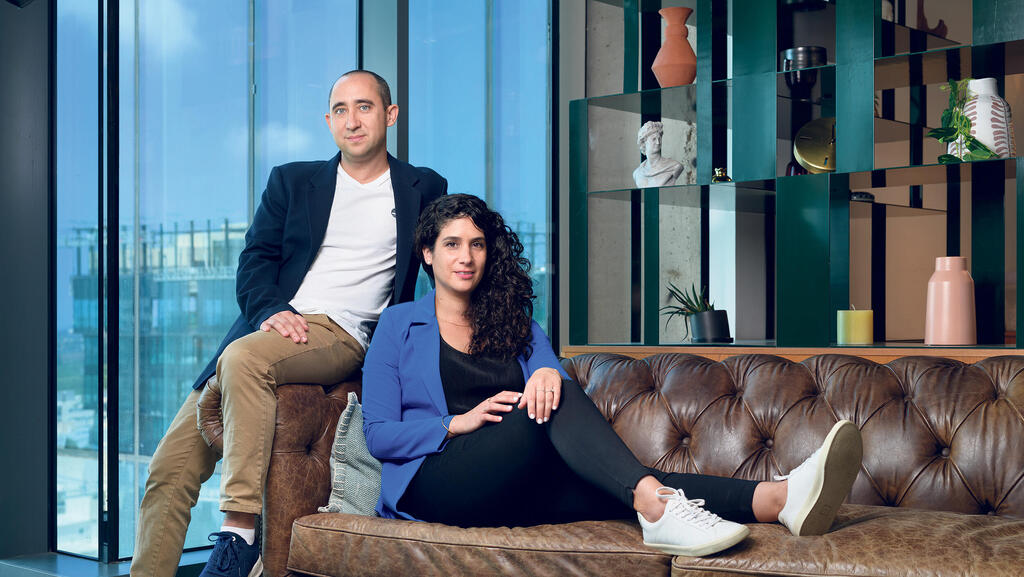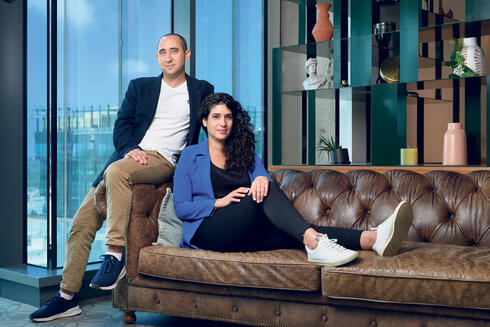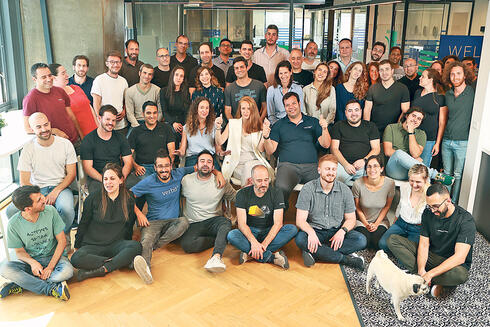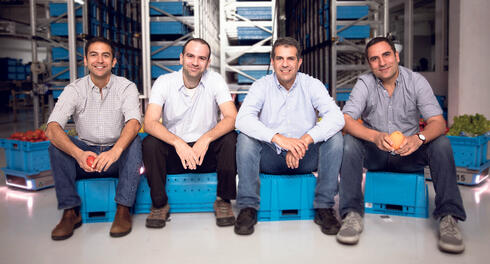
"Many techies could have been very wealthy, but they didn't understand the situation in the market"
Adi Weitzhandler and Meir Steigman, a husband and wife, co-founded Valoo to connect buyers and sellers of stocks in private tech companies, while attempting to solve the question of how much Israeli tech startups are truly worth
In recent months, a massive deal has been brewing, in which former employees of an Israeli unicorn will sell their stocks in the tech company, for a cumulative sum of $200 million. This deal has become the main subject during coffee breaks, lunchtime, and team-building days across the Israeli high-tech sector for a number of reasons. It is unprecedented in magnitude for a deal outside of regular investment rounds and is the result of the active mobilization of veteran employees and investors. The deal is also exceptional considering the crisis that the tech industry, particularly in Israel, is facing. Large funds no longer chase after stockholders, and although the latter are eager to sell, potential buyers are not rushing to cooperate.
The question hovering over this deal, and over every private startup, is how much these companies are truly worth. To answer this question, entrepreneurs Adi Weitzhandler and Meir Steigman founded the company Valoo, a platform that connects buyers and sellers of shares in private tech companies. Unlike its competitors, Valoo also provides an assessment of the companies' value by weighing data from various sources and giving a rating based on the source’s reliability and accuracy. This is intended to boost the likelihood of completing secondary deals, which often fail due to disagreement between parties over the company's value.
"Many techies could have been very wealthy today, but they didn't understand the situation in the market," says Weitzhandler. "In 2021, many deals didn't materialize because there was a gap between the value the seller saw and what the buyer saw. This mainly involved less sophisticated sellers and former employees who didn’t understand the true state of the company. When we recommended that they sell their stock, we received responses like 'it's lower than the estimated value in the IPO,' except the IPO never happened. They could have made a killing, but since they didn't understand the true value of the asset they held, they missed out big time."
Today, says Weitzhandler, the situation is completely different. "The supply of stock in tech companies is infinite, and the number of deals has soared," she explains. "In 2021, we canceled most deals due to the pricing gap, where the seller wanted 150% more than the estimated value according to our platform. In contrast, now we have an almost endless stream of sellers, who come directly from the companies, as well as from former employees and angel investors."
One of the reasons for this is that companies are barely raising funds or going public, while employees need money. The rise in mortgage interest rates is also pushing employees to sell their stocks. For many tech employees, there is a feeling that after the successful exits in 2021 and 2022, where almost every funding round had a secondary deal and the cumulative value of the stocks sold reached billions of dollars, there is nothing left to sell, and if there is, it is currently impossible because the exercise prices are lower than the current company valuations.
"Most of the employees who switched jobs during the good years cannot exercise their options now because their value is lower than the company's valuation, but those who started working at a company in 2018, for example, and stayed there, still benefited despite the downturn," adds Weitzhandler. "There's a huge gap between employees who took advantage of the generous salaries during the good years to switch jobs and those who didn’t and stayed with the same company. Today, these employees have options that are closer to the company's value and are also closer to maturity. Employees who started at a new place in 2021 indeed improved their salaries, but were hurt in the equity component. Out of 400 companies registered in our system, 15% of the stocks have not received an offer from a buyer, which means there is a huge pool of around $7.3 billion worth of stock for sale."
Related articles:
Co-founder and CEO Meir Steigman, echoed a similar sentiment. "Despite the madness of recent years, employees still haven’t learned to fully appreciate the value of equity. They have learned to ask questions, but it's still secondary to salary.” He says that most employees think of options as a lottery ticket, rather than carrying the same importance as a salary. “When employees start exercising their options themselves or see their friends doing it, then they start seeing equity as real money."
How many employees actually have the ability to receive a substantial amount, one that can change their lives?
"During the regular life of the company, it's hard to reach a life-changing event. Something like that only happens when something significant occurs for the company, like a sale or an IPO, or when enough time has passed since the options were granted. Most of the time, it's former employees with whom we mainly work. Not long ago, we had a deal with a former employee who sold stocks for $2.7 million, and there was also a $2 million deal. But these are former employees. For current employees, if there are options that have already matured, most of them do not net significant amounts."
So, in fact, your platform is more suitable for less favorable periods in the market when everyone is dealing with declines in valuation?
"In the first half of 2023, we saw a sharp increase in scope and the number of transactions, and we also managed to build quite large 'blocks' of stock worth $30-40 million in a single company. This is of interest not only for private companies or investors but also for larger institutions."
What will happen when valuations rise again, and investment funds are hungry for employees' stock?
"As long as there are countless sellers in each of the companies we work with, there won't be an increase in valuation. I don't expect an increase in private market valuations until the end of the year, but towards the end of 2024, the existing opportunities will start to close. We have to take advantage of the current period. Only after the IPOs on Wall Street begin will sellers realize there's another way to liquidate their holdings, and then we will see valuation increases. In 2021, some employees didn't seize the opportunity because they couldn’t see the forest for the trees."
Weitzhandler and Steigman, both 37 years old, are not just business partners who started a startup but a married couple with two children and an unconventional story. Weitzhandler and Steigman first tried their ability to discover hidden value on themselves. They met while studying law at Reichmann University, but they could have met in 100 different ways, in fact, it's highly likely that they crossed paths as children. Weitzhandler is the daughter of a formerly religious father, and would make the journey from Rehovot where she grew up to Jerusalme to visit her grandmother in the religious neighborhood of Mea She’arim. Steigman grew up just a few houses over.
As Weitzhandler got a glimpse into the ultra-Orthodox way of life on weekends with her grandmother in Jerusalem, Steigman, whose mother grew up secular, was exposed to the secular lifestyle when he visited his grandparents. "My grandparents from my mother's side had a TV, and that's where I saw for the first time that there are secular people who don't murder and rape as I had been taught," he said. "I saw that despite having a TV, the heavens did not fall on them." The heavens did not fall even when Steigman started to question everything he had been taught.
"I grew up in a model ultra-Orthodox family and was an outstanding student who studied in the community’s most prestigious yeshivot - 'Etz Chaim,' and then 'Ateret Yisrael,' which are like the Harvard of the Haredi world," he laughed. "I enjoyed learning Torah, but in terms of faith, things didn't add up for me. At the age of 13, I began to ask myself questions, and at 14, I started asking the people around me as well. The answers I received were not interesting but more like 'keep learning, and faith will come to you' or 'make an effort, and it will come.' But I also had doubts about the very existence of God and His existence in light of modern life. I didn't understand why God would ask me for specific things in my daily life. At the age of 14, I stopped observing Shabbat, but I continued to study and pray to God to give me the strength to believe in Him. In the evening, I would go to parties."
At this point, even though the two have been married for over a decade, Weitzhandler asks her husband, "Why did you insist on trying to believe?" He says, "I simply loved the ultra-Orthodox way of life and my life within it," he replies. "Everything worked well for me - I was an outstanding student in the best yeshivas, and my future was already planned: I knew who I would marry, when, and what I would receive when it happened. Everything was very clear and comfortable. I would receive an apartment and a car from my future wife’s family."
How do you give up such a comfortable future?
"Around 18, I told my parents that I wanted to enlist in the IDF, in one of the Haredi units. They took me to a well-known rabbi in the community, whose name I promised not to reveal. The four of us had a conversation, and then the rabbi asked to speak with me alone and asked me one question: 'Do you observe Shabbat?' Until then, I had hidden this fact, but he asked me to tell the truth. When I answered that I no longer observe Shabbat, he called my parents back and without telling them about it, said that he approved of my enlisting."
After two years of service in the IDF, Steigman began an academic program which prepares graduates for secular life. "Until the age of 20, I didn't study mathematics and English at all," he says. "In my English studies, I started from ABC. In the entrance exam to the program, when I received an equation with an unknown in mathematics, I didn't understand what they wanted from me. I called the examiner to explain the question to me." Later, within a year that included many sleepless nights, Steigman says, he made his way through advanced textbooks, which are considered challenging even for the best mathematics students. He went on to study law at Reichmann University.
How did you know you wanted to study law at Reichmann?
"I mapped out several role models that interested me, politicians and businessmen, and I found out that they all studied law with a financial track, specialized in major law firms, and then stopped practicing. That's exactly what I did. As for where to study, I didn't know, but a friend’s brother told me about Reichmann. I checked what was needed to be accepted to the Hebrew University and Reichmann and saw that there was a track that suited me better. At the same time, I found out that there was a nearly full scholarship from Reichman for two graduates of my preparatory program."
What was the most difficult thing about the change you made?
"The actual understanding of what was going on outside. When I joined the army, for example, I had no idea what the differences were between the various units. I knew in general terms that there was something called Golani and Givati, but not more than that. I knew nothing about the Air Force, Navy, or Intelligence Corps. My world was limited to a few Haredi units. The entire conversation was intentionally absent in the Haredi media and libraries. The idea is that you should have no information coming from the outside. This was 15 years ago. Today, it's harder to create this barrier, and I assume that the disconnect in Haredi society is smaller."
Steigman won a scholarship to study at Reichmann, and currently serves on the board of directors for Hillel, an organization that supports those leaving the ultra-Orthodox community, and one of the organizations that funded his scholarship. He is also credited with the transformation the association underwent, which once employed a small staff on a small budget in the past, but now has dozens of employees and an annual budget of NIS 19 million ($5.1 million). Steigman, together with businessmen Shuki Goldwasser and Barak Dotan, hired Yair Hass as CEO. The organization is also partly responsible for facilitating the meeting between Weitzhandler and Steigman.
"I met Meir when I was a student at Reichmann, and I volunteered for a project with Hillel," Weitzhandler recounts. "Meir introduced the organization’s activities, and there was something in his look that caught my attention. We were volunteering at Tel Aviv University, but in the evening, I went to my regular class at Reichmann, and someone sitting in front of me turned around and asked me a question - it was Meir. In hindsight, I realized that he noticed me at the beginning of the year, and made sure to sit in front of me during classes," Weitzhandler surmises, adding, "Because I knew the Haredi world from visits to my grandmother, I immediately recognized something in him, and I asked him directly, 'You used to be Haredi, right?' He was surprised and asked how I knew. It was something even in the way he looked, there was no question."
Steigman maintained his academic excellence in the secular world and completed his studies with an average close to 100, despite struggling with English throughout his degree, a gap that he found harder to close than in mathematics. "I was in the top three in the faculty academically, but I couldn't get an honors mention from the dean because I failed English," Steigman says. After completing his specialization in law, he flew to London for a few months, and there he permanently closed this gap as well.
A professional partnership
While Steigman was in London, Weitzhandler flew to Beijing to study Mandarin. After they both returned to Israel, each continued their respective paths. Steigman worked at law firm Meitar for three years, while Weitzhandler went to work in the large prestigious law firm Fischer Behar Chen Well Orion & Co. where she established the Chinese department. At this point, they were already living together, which created some difficulties for the law firms they worked for.
"My first client in 2014 was Bright Food, the Chinese food giant that was conducting due diligence on Tnuva prior to its acquisition," Weitzhandler recounts. At the same time, Steigman was representing Tnuva. "Everyone knew about us and at a certain point we were asked to decide who would stay on the case,” says Weitzhandler. They found themselves in a situation in which they had to choose which one of them would give up handling one of the biggest deals in the country's history.
It's not trivial that you were the one who stepped down and not Adi.
"It was very clear - since it was related to China it was Adi's territory, so I stepped back," Steigman says without hesitation. Shortly after, he received another significant deal, representing Facebook when it was bidding for the acquisition of Waze for a billion dollars, but they eventually lost the deal to Google. Later, Steigman once again had to give up on a major deal, representing Clal Insurance, while Weitzhandler represented one of the Chinese bodies that was interested in acquiring it.
In retrospect, did the regulators in Israel do the right thing by not approving the sale of the insurance company to the Chinese?
"In China, it is very clear that there is no business without a government angle. Everything that is considered business is also political," Weitzhandler explains. "As much as they might appear to be individuals and capitalists, they know that the collective is above everything, and everything must contribute to the state. This perception cannot be judged from a Western perspective because they play by entirely different rules. If the Phoenix insurance company had been sold to the Chinese, it would have involved significant risk." According to her, this perspective is also relevant for startup companies. "There are many deals that are born due to the desire to clear the company's stock from Russian or Chinese money because of geopolitical tensions. We also have to commit to our client companies that we will tell them who the buyers will be, as some of them cannot approve Russian or Chinese shareholders."
In 2015, Gross & Co. law firm approached Weitzhandler to manage a large and established Chinese department - before she even turned 30. Meanwhile, Steigman specialized in advising startups and gained a reputation for expertise in valuation assessments. He worked with companies like IronSource, which went public in 2021 with an IPO of $11 billion and was sold in 2022 for $4 billion to gaming giant Unity.
"While I was working at Meitar, the Prime Minister's Office contacted me and offered me an intelligence-security position. To this day, I don't know how they reached out to me," Steigman says. After passing the selection process but refusing to accept the designated position, he was asked to establish a new unit in the Prime Minister's Office with a connection to the financial and economic worlds. "Even though I'm no longer there, the unit is still operational and expanding," he says. "They occasionally update me on their successes. I said from the beginning that I would stay for four years because I didn't want to be a government employee - I came to establish something and move on."
Weitzhandler patiently waited for Steigman to finish that chapter in his career before they jointly created their joint venture. "We were never lawyers at heart. This year, for the first time, we voted in the elections for the Israel Bar Association because of their importance," she jokes. "We always knew that we would create something together because we are good at it. Everything we did in the economic field worked well for us, whether it was investments or real estate purchases. We are complete opposites and it works really well for us. I am less motivated by money and more so to make a change."
In 2019, when their children were 2 and 3.5 years old, the couple set out on their own and founded Valoo. The idea was to take the knowledge they gained in evaluating companies and turn it into technology that would facilitate connections between buyers and sellers of assets - stocks and options - whose value is a matter of perspective. Companies that do not agree with Valoo's valuation are not accepted on the platform. "We saw the need for the platform because there were many obstacles to secondary transactions," Weitzhandler says. "Until then, 'secondary' was a dirty word, and many efficient transactions that both parties wanted did not occur. When we looked at the field, we realized that the existing solutions were not technological; they were quick fixes. By 2019, the market had matured."
How do you establish a startup when you have two toddlers at home? Did you sit on the couch in the living room after putting them to sleep and build a business model?
"Exactly like that, and the timing wasn't particularly genius," they laugh. "Over the years, we saw that there were excellent platforms like Nasdaq's Secondary Market or Carta, but they work best when there is already a valuation."
"Haredi men want to integrate into society and work"
Valoo has not raised money from VC funds yet, and its funding mainly comes from self-funding and angel investors, including Ben Yaniv Chechik, Co-founder of fintech company Payoneer, who also serves as an advisor to Valoo, and serial entrepreneur Eyal Gura, who is on its board of directors. The company has 12 employees, and according to Weitzhandler and Steigman, it has generated revenues from its first day. They say that Valoo's current revenues reach several million dollars annually, with a business model based on receiving a commission for each transaction made through the platform. Out of 400 companies listed on the platform, around 200 transactions have been conducted within about 20 companies.
Among the unicorns that can be found on Valoo's platform are Verbit, VIA, Fundbox, eToro, Fabric and other companies. On the buyer's side, investors need to have over NIS 8 million ($2.1 million) in liquid assets, according to the rules of the Israel Securities Authority.
In contrast to other secondary platforms, Valoo emphasizes working in coordination with companies, which are sometimes reluctant to cooperate with employees seeking to sell their stocks. With Valoo’s model, stocks being sold are registered in the platform's name, not the final buyer's name, and they remain that way until the company goes public on the stock exchange or is sold. This makes it easier for companies because even if many private secondary transactions are conducted with their stocks, they only have one new shareholder.
Coatue recently estimated that the value of the unicorn companies has dropped on average by 50% compared to 2021. Is this also reflected on your platform?
“Companies like Cybereason, Pagaya, and Riskified were not accepted onto our platform before they went public due to gaps in their valuation. The Valoo system, which is now also used by VC funds as an additional evaluation measure to assist in valuing companies, offers much lower numbers than those relied upon by founders, angel investors, and employees. Valoo's estimates were proven correct after the valuation of Cybereason plummeted in its latest fundraising round, Pagaya, which was valued at $8.5 billion, is being traded at $1.74 billion, and Riskified, which was valued at $3 billion, is being traded at around $800 million.
"Despite the political upheaval, there is considerable interest from investors from the United States and Canada, as well as institutional bodies, in Israeli tech stock," the two founders note. "We are not yet profitable because we are continuing to invest in developing and expanding our presence in the American market. In addition, given the growing interest from institutional bodies, we are building a sort of ETF that can invest in stocks of 20 private Israeli tech companies."
Do you employ Haredi employees in Valoo?
"We had a Haredi employee, and we host Hillel fundraising evenings on a regular basis."
How do you solve the challenge of integrating Haredim into the workforce?
"Haredi men, including several friends I am in contact with, want to integrate into the secular world and work," Steigman clarifies. "In the secular world, they don't understand that everything comes down to communal leadership and also to our inability to understand them. If we have the right lense to examine the Haredi community, it will be the first and crucial step towards their integration into the workforce. There is a significant core that wants to enter the workforce, and if we integrate them, many others will follow suit."


